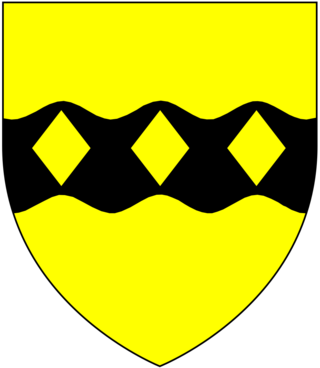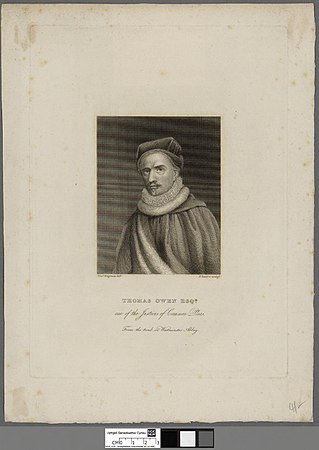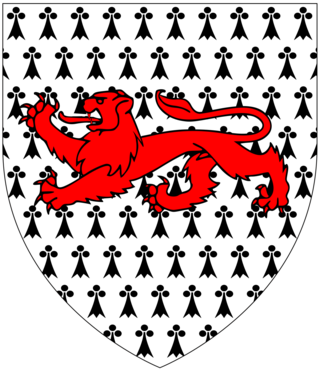
The Cary family is an English aristocratic family with a branch in Ireland. The earliest known ancestor of the family is Sir Adam de Kari who was living in 1198. Sir John Cary purchased the Manor of Clovelly in the 14th century and established the family's status as members of the landed gentry. Various branches of the family were ennobled in the late 16th and early 17th centuries as Baron Hunsdon and Viscount Falkland.
Rev. John Prince (1643–1723), vicar of Totnes and Berry Pomeroy in Devon, England, was a biographer. He is best known for his Worthies of Devon, a series of biographies of Devon-born notables covering the period before the Norman Conquest to his own era. He became the subject of a sexual scandal, the court records of which were made into a book in 2001 and a play in 2005.

John Harington, 1st Baron Harington of Exton in Rutland, was an English courtier and politician.
William Fleetwood was an English lawyer and politician. He was Member of Parliament for Marlborough in 1558, Lancaster in 1559 and 1567, and for the City of London several times between 1572 and 1592, but his most significant position was as Recorder of London from 1571 to 1591. A lawyer of the Middle Temple, he was a Queen's Serjeant in 1592.

Thomas Harris (1547–1610) was an English barrister and politician. He became serjeant-at-law in 1589.

Nicholas Duck, of Heavitree and of nearby Mount Radford in the parish of St Leonards, both next to Exeter in Devonshire, was an English lawyer who served twice as a Member of Parliament for Exeter, in 1624 and 1625. He was one of the Worthies of Devon of the biographer John Prince (1643–1723), whose wife was his great-niece.

Sir John Acland of Columb John in the parish of Broadclyst, Devon, was an English knight, landowner, philanthropist, Member of Parliament and Sheriff of Devon. He was one of John Prince's Worthies of Devon.

Sir William Strode (1562–1637) of Newnham in the parish of Plympton St Mary, Devon, England, was a member of the Devon landed gentry, a military engineer and seven times a Member of Parliament elected for Devon in 1597 and 1624, for Plympton Erle in 1601, 1604, 1621 and 1625, and for Plymouth in 1614. He was High Sheriff of Devon from 1593 to 1594 and was knighted in 1598. In 1599 he was appointed Deputy Lieutenant of Devon. There is a monument to him in the parish church of Plympton St Mary.

Francis Beaumont of Grace-Dieu in the parish of Belton in Leicestershire, was a judge.

Thomas Owen was an English judge and politician in the reign of Elizabeth I.

Sir Arthur Bassett (1541–1586) was a member of the prominent west-country Basset family and was MP for Barnstaple in 1563 and Devon in 1572. He served as JP for Devon from 1569 to his death and as Sheriff of Devon in 1574–5. He was knighted in 1575. He had been appointed deputy warden of Stannaries by 1580.

Sir John Hele of Wembury in Devon, serjeant-at-law, was a Member of Parliament for Exeter and was Recorder of Exeter (1592–1605). He was one of Prince's Worthies of Devon (1701). He built at Wembury one of the grandest manor houses ever seen in Devon, called by his near contemporary Risdon : "A magnificent house, equalling, if not exceeding, all other in these western parts, for uniform building; a sightly seat for shew; for receipt spacious; for cost sumptuous; for sight salubrious". It was already a ruin by about 1700, and was finally demolished in 1803. He founded a boys' hospital in Plymouth. His monument and effigy survives in Wembury Church.
The Black Assizes is an epithet given to several outbreaks of "gaol fever" which struck various prisons and court-houses in England in the late 16th century and which caused the deaths of not only many prisoners awaiting trial but also the magistrates in the court buildings holding assizes.

John Peryam, of Exeter, Devon, was elected four times as a Member of Parliament, for Barnstaple 1584, Bossiney 1586, Exeter 1589 and 1593. He served as Mayor of Exeter. He was the younger brother of Sir William Peryam (1534-1604) of Little Fulford, near Crediton in Devon, Lord Chief Baron of the Exchequer.

Bableigh is an historic estate in the parish of Parkham in North Devon, England. It is separated from the village of Parkham by the Bableigh Brook. It was the earliest recorded seat of the Risdon family in Devonshire, from which was descended the Devon historian Tristram Risdon.

Sharpham is an historic estate in the parish of Ashprington, Devon. The Georgian mansion house, known as Sharpham House, overlooks the River Dart and is a Grade I listed building. The house was commenced in about 1770 by the Royal Navy captain Philemon Pownoll to the designs of the architect Sir Robert Taylor (1714–1788). In the opinion of Nikolaus Pevsner it contains "one of the most spectacular and daring later 18th century staircase designs anywhere in England". The park and gardens are Grade II* listed in the National Register of Historic Parks and Gardens. Part of the descent of Sharpham is shown on the Palmes family heraldic pedigree roll.

Mount Radford is an historic estate in the parish of St Leonards, adjacent to the east side of the City of Exeter in Devon.

The recorder of Barnstaple was a recorder, a form of senior judicial officer, usually an experienced barrister, within the jurisdiction of the Borough of Barnstaple in Devon. He was usually a member of the local North Devonshire gentry. The position of recorder of any borough carried a great deal of prestige and power of patronage. The recorder of a borough was often entrusted by the mayor and corporation to nominate its Members of Parliament, as was the case with Sir Hugh I Pollard, Recorder of Barnstaple, who in 1545 nominated the two MP's to represent the Borough of Barnstaple. In the 19th century a recorder was the sole judge who presided at a Quarter Sessions of a Borough, a "Court of Record", and was a barrister of at least five years' standing. He fixed the dates of the Quarter Sessions at his own discretion "as long as he holds it once every quarter of a year", or more often if he deemed fit.

The Drewe family of Broadhembury are generation owners and inhabitants of The Grange, Sharpham, Broadhembury, Wadhurst Park, Devon, in the west and east of England, from the 16th century to the current date.

Sir John Whiddon of Whiddon in the parish of Chagford in Devon, was a Justice of the Queen's Bench from 4 October 1553 to his death on 27 January 1576, during the reigns of Queen Mary I and Queen Elizabeth I.





















